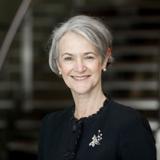Professor Caroline Homer AO is a midwife and maternal and newborn health researcher. Her research addresses maternal and newborn health issues, especially the role of midwives in improving outcomes in limited-resource settings, with a focus for more than 20 years on the Asia-Pacific region.
Professor Homer was one of four distinguished female researchers to receive 2022 NHMRC Elizabeth Blackburn Investigator Grant Awards. Her award was for the highest ranked female recipient (Leadership category) in the Health Services research area of the Investigator Grants scheme. Read on to find out more about Professor Homer’s career in midwifery and research, in her own words.

I feel very honoured to have been awarded an NHMRC Investigator Grant. I am a midwife andfor the last 30 years, I have been committed to improving the quality of care provided to childbearing women, their babies and families. That was initially as a clinical midwife and then also as an educator, academic, researcher and implementer of services and programs. I was at the University of Technology for 13 years as Professor of Midwifery and was fortunate to lead projects to strengthen midwifery across the region, especially in Papua New Guinea, Cambodia and Samoa. In 2018, with an NHMRC Research Fellowship, I moved to the Burnet Institute where I have been able to build on those relationships and connections and now work closely with the United Nations Population Fund (UNFPA) and the World Health Organization (WHO) on ways to improve maternal and newborn health in the Asia-Pacific region.

My research is focused on the role and capacity of well-educated and supported midwives to reduce maternal and newborn deaths and stillbirths.
Midwives can provide high quality care that is kind, respectful, meets women’s needs and helps families have a good start to parenthood.
I was part of research that showed that there is a global shortage of 900,000 midwives with considerable gaps in quality of care due to poor midwifery education and a lack of midwifery leadership and other research which showed midwives could make a difference. The post-COVID-19 period is a critical window to improve maternal and newborn care services and many countries in the Asia-Pacific region are still struggling to get back to where they were pre-pandemic.
I have been very fortunate to have a research career. I am a hospital-trained nurse and midwife and very little of my training ever mentioned research or evidence. I have always been a curious person though and I wanted to work in an area that made a difference, not only in Australia but also globally. As a very new midwife, I worked in a small mission hospital in Malawi in sub-Saharan [Africa] as a labour ward midwife and that experience was highly formative and inspiring. It was clear that good midwifery care could make a huge difference, especially in [a] very resource-limited setting. Making this happen has been my focus ever since.

My advice for early career researchers is to find an area that you are passionate about and that can inspire and drive you. Research is hard work and there are lots of setbacks and disappointments but that is easier to bear if you [are] working on something that you feel strongly about and you have a good team around you.
Research is definitely a team sport and I value the amazing teams I have worked with, and continue to work in.
I also strongly advocate finding good mentors and supporters and making connections, strong collaborations and networks. My mentors and supporters have made all the difference and I thank them hugely. Now I try to be a good mentor to others. There is a phrase I am using a lot which is to be a good ‘ladder holder’ for others – I was lucky enough to find people who held ladders for me to climb – I am now determined to hold other ladders and support others, especially women and other nurses and midwives.
Find out more about the 2022 Research Excellence Awards.
